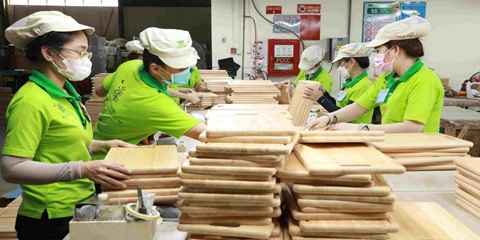Want to be in the loop?
subscribe to
our notification
Business News
REAL ESTATE MARKET GETS MORE STABLE
The Vietnamese real estate market is entering the last quarter of 2018. Remarking on market performance from the beginning of the year, an official from the Ministry of Construction said that the market had relatively stable growth, abundant supply and more practical product valuation. Hence, the actual demand also picks up significantly. The Ministry said that a potential boom in land demand may be seen in areas with good cooperation, but the market will be generally stable.
Data from the Ministry of Construction, collected from real estate exchanges, showed that Hanoi had about 8,650 successful deals in the first two quarters of 2018, up 24.6 per cent year on year, while Ho Chi Minh City had about 9,550 deals, up 31.4 per cent.
Many opportunities and challenges
In Hanoi, the second quarter saw a slight increase in apartment segment from the previous quarter, but suffered a little decrease from the same period of 2017. In contrast, the personal housing segment expanded by 1.84 per cent from the first quarter, and 3.01 per cent from the same period a year ago.
In Ho Chi Minh City, the apartment segment rose 1.4 per cent from the first quarter and 3.43 per cent from the same period of 2017. Similarly, the personal housing segment climbed 3.24 per cent quarter on quarter and 10.42 per cent year on year.
Real estate inventories continued to show positive signs as this index fell sharply. Real estate inventories valued only VND24,072 billion (over US$1 billion) as of the end of June 2018, down 5 per cent (equivalent to VND1,310 billion) from late 2017 and down 81.27 per cent from the peak of VND104,476 trillion (US$4.5 billion) in the first quarter of 2013.
The decline in real estate inventories has reduced burdens on the economy and all segments have continually improved their stock exposures over the past three years, resulting in a sharp rise in projects under construction and pending for licence. The number of newly established property enterprises also increased rapidly.
According to industry experts, in the 2018 - 2020 period, the real estate market will further improve the demand and supply balance, which is considered an important condition for the market to develop sustainably. In major cities, strong fluctuations in the real estate market will focus on the synchronous infrastructure development that generates the room for medium and long-term development investment.
In addition to solutions aimed to stabilise the real estate market and prevent a market bubble, a lot of shortcomings are yet to be resolved, including unreal buying spree and slowly responded policies. For example, when the market has new real estate products like condotel and officetel, policymakers feel baffled in administration. Moreover, policies on small-size houses are still inconsistent. Even, policies on preferential loans for social housing development have been introduced for a long time, but we still lack guidance for application or lack funds for carrying out. Property derivatives like mortgage refinancing system, mutual savings bank, or trust fund have been long planned but they are still on the table rather than in life.
Mr Can Van Luc, a member of the National Advisory Council on Financial and Monetary Policies, said, like Thailand or Singapore, Vietnam should have a common housing savings fund. At the same time, the country needs to concentrate on perfecting and developing the capital market to create medium and long-term funds to balance the financial market structure and give seed money for housing savings funds and social housing programmes.
Ensuring stable market development
Deputy Construction Minister Le Quang Hung affirmed that the Ministry of Construction will continue to keep a close watch on the real estate market in order to timely introduce solutions to control the market and speed up the common software development to connect and integrate data into the system to portray a more panoramic picture of the real estate market; and will urge, supervise and coordinate with relevant ministries, branches and localities to guide market data system construction, management, operation and updating.
The Ministry of Construction will soon complete and submit to the Prime Minister the project “Economic security in social security-ensured housing and real estate market”, and “Development assessments, trend forecasts, market solutions and policies recommended for stable and healthy real estate market development”.
According to property specialists, in late 2018 and 2019 when credit availability is limited, capital access will be harder for investors and customers. This will affect transactions and, coupled with objective factors like higher land price and higher input costs, will slow down the market growth. Especially, condotel projects or financially viable projects will be largely affected, while M&As may thrive in the period.
Mr Nguyen Viet Cuong, President of KOSY Group, said that real estate businesses now need to be more flexible to meet real demands. They should first of all focus on active solutions and comparative advantages like building and developing corporate values, and building the creditability with customers and partners. This is the core factor to be different from their peers and enhance their reputation and position. In addition, they need to step up investment research and market surveys before making investment decisions, choosing appropriate segments and strategies to their competences.
Source: VCCI
Related News

A STELLAR CHRISTMAS AT SOFITEL SAIGON PLAZA
Experience the magic of year-end celebrations in five-star luxury, where Parisian elegance meets Saigon’s festive vibrancy. Discover your Stellar Christmas moments: https://sofitel-saigon-plaza.com/festive-offer-2025

CONSTRUCTION SECTOR POSTS OVER 9% GROWTH IN 2025
Industries under the ministry’s management accounted for an estimated 17.23% of national gross domestic product (GDP), up about 0.17 percentage point from 2024. They contributed around 1.96 percentage points to overall GDP growth, reported the Vietnam News Agency. The contribution helped push Vietnam’s economic growth to above 8% in 2025 and supports the Government’s aim of pursuing double-digit growth in the coming years.

VIETNAM PUTS PUBLIC INVESTMENT DISBURSEMENTS AT VND603.6 TRILLION
Vietnam’s public investment disbursements had amounted to VND603.6 trillion in the year to December 18, equivalent to 66.1% of the plan assigned by the prime minister. According to the Ministry of Finance, actual disbursements by December 11 had totaled VND577.7 trillion, or 63.3% of the prime minister-approved plan of VND913.2 trillion, the Vietnam News Agency reported.

SHINE INTO 2026 AT HOIANA RESORT & GOLF!
This New Year’s Eve, celebrate where the sea meets the sky. Vibrant performances, festive dining, DJ beats, live bands and dazzling fireworks come together for one unforgettable night. From beachfront countdown moments to curated New Year’s Eve dinners across Hoiana, every detail is designed to welcome 2026 in style.

VIETNAM’S TRADE SET TO SURPASS US$900 BILLION FOR FIRST TIME
Vietnam’s total import-export turnover is expected to reach about US$920 billion by the end of the year, marking the first time the country’s trade value has exceeded the US$900-billion mark. As of December 15, Vietnam’s total trade turnover stood at US$883.7 billion, according to the Agency of Foreign Trade under the Ministry of Industry and Trade.

GLOBAL SOURCING FAIR VIETNAM 2026 – THE TRULY GLOBAL B2B SOURCING SHOW IN VIETNAM TO EXPAND & DIVERSIFY YOUR EXPORT MARKETS WORLDWIDE
The 4th edition of Global Sourcing Fair Vietnam returns in 2026 with an impressive scale, featuring 700 booths showcasing Fashion & Accessories, Home & Gifts, and the newly introduced Printing & Packaging Products from 500+ verified suppliers across Vietnam and Asia – including Mainland China, Taiwan, Hong Kong SAR, South Korea, India, Bangladesh, ASEAN, and more.
























